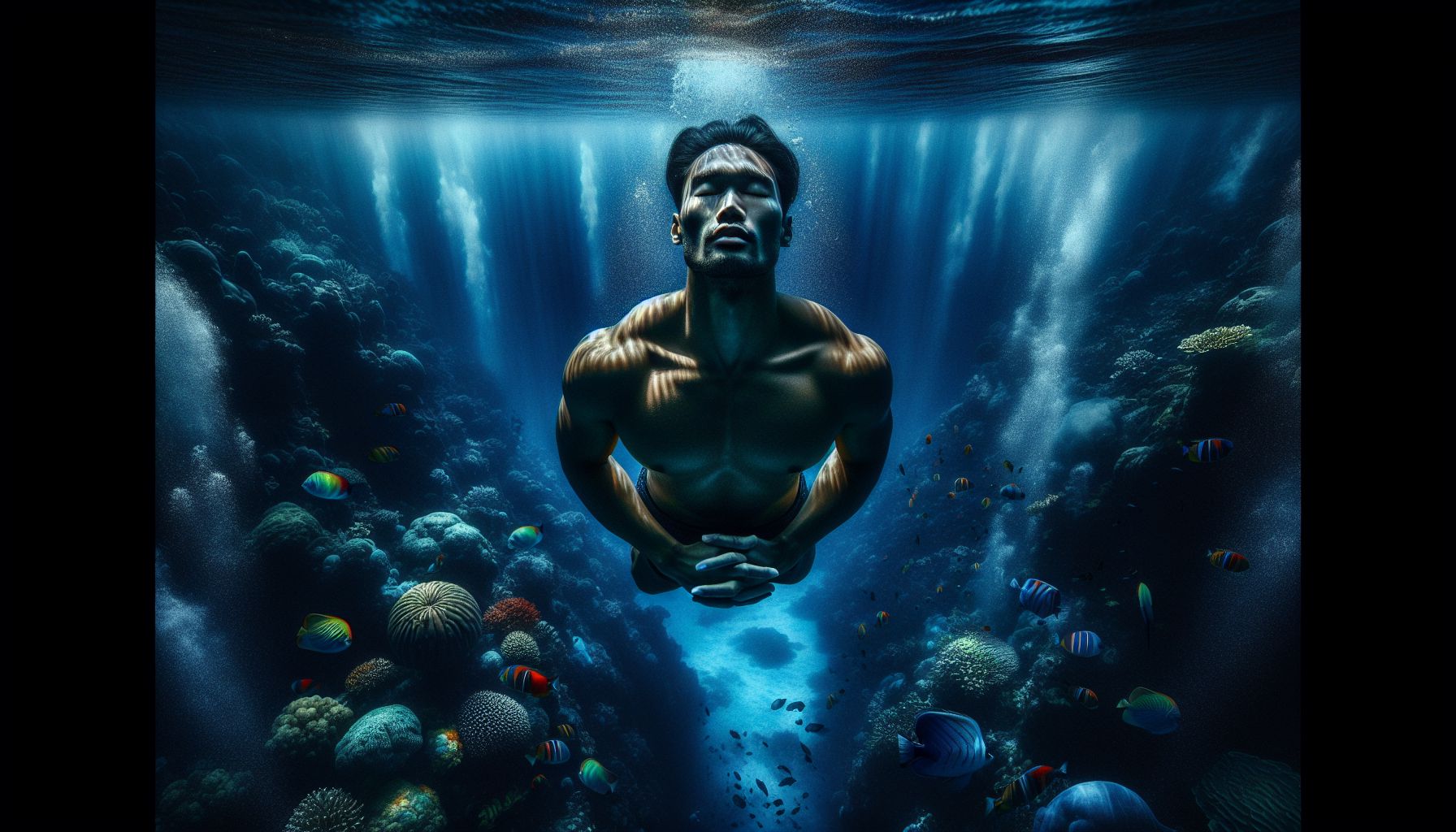Freediving is not just a sport; it’s a voyage into the depths of the sea and the human spirit. As the diver descends, the world above grows distant, and a serene silence envelops them. With each meter dived, the heartbeats slow down, and the connection to the aquatic world deepens. This is a journey that dares the human condition to peel back its complex layers, revealing an introspective narrative about existence, purpose, and our place within the tapestry of life on Earth.
The Essence of Freediving
Unlike other underwater activities, freediving dispenses with the use of artificial breathing apparatuses. It requires the diver to hold their breath while exploring the underwater realm. This minimalistic aspect of the sport brings freedom and an incomparable sense of connection with the sea. It takes the diver back to the primal roots of human existence – an era when our ancestors foraged the seas for sustenance and the spirit of exploration was born.
History and Freediving Evolution
Freediving is an ancient practice, with records of its existence dating back thousands of years. The Bajau people of Southeast Asia and the Ama divers of Japan are historic examples of communities that have relied on freediving to harvest pearls and sponges or catch fish. Over time, freediving has evolved into a competitive sport, with athletes striving to reach ever-greater depths.
The Mental and Physical Discipline
The essence of freediving lies in its blend of mental and physical discipline. Mastering freedive requires rigorous training and a profound understanding of one’s physical capabilities. Divers must regulate their heartbeat, conserve oxygen, and equalize pressure as they descend, all while remaining mentally focused and calm.
Benefits of Freediving
The benefits of freediving are manifold. It improves breath control and lung capacity, strengthens muscles, and promotes cardiovascular health. Additionally, the need for calmness and focus makes it a meditative practice, decreasing stress and enhancing mental clarity.
Training for the Depths
Training for freediving involves several components, from breath-holding exercises to in-water practice. Proper training is crucial, as freediving can be dangerous without adequate preparation and understanding of one’s limits.
Breath-Holding Techniques
The cornerstone of freediving training is learning to hold one’s breath for extended periods. Techniques like diaphragmatic breathing, meditation, and CO2 and O2 tables are used to increase breath-hold times.
Safety Protocols
Safety may never be compromised. Buddy systems, surface support, immediate access to emergency services, and understanding the risks of shallow-water blackout are vital.
Gear and Equipment
While freediving is minimalistic, specific equipment enhances the experience and ensures safety. This includes:
- Freediving Fins: Long and flexible, these fins help with deeper and more efficient dives.
- Low Volume Masks: These are easier to equalize and are less buoyant than traditional diving masks.
- Wetsuits: They offer protection against the cold and elements.
- Depth and Time Monitoring Devices: Watches or dive computers that allow divers to monitor their dive metrics.
- Weight Systems: These help divers achieve neutral buoyancy at desired depths.
Competitive Freediving
The competitive aspect of freediving pushes the limits of human potential. Various disciplines such as Constant Weight (CWT), Free Immersion (FIM), and Variable Weight (VWT) showcase different aspects of the sport. Records are continuously broken, and the human body’s adaptability is constantly redefined.
Mental Preparation
Competitors spend significant time preparing mentally. Visualization and psychological conditioning are crucial for coping with the stress of deep dives and for maintaining proper technique under pressure.
The Role of Safety in Competitions
In competitive freediving, safety protocols are even more stringent. Competitors are monitored by medical staff, and safety divers are assigned to follow athletes during their dives.
Entering the Freediving World
For beginners, starting freediving is about finding the right guidance and gradually progressing. It is important to:
- Take a Freediving Course: This will provide the foundational knowledge and skills, along with safety practices.
- Join a Community: Being part of a freediving community offers support, shares experiences, and fosters a safety culture.
Freediving Destinations
There are exceptional spots around the globe for freediving. Destinations like the Blue Hole in Dahab, Egypt, and Dean’s Blue Hole in the Bahamas, serve as meccas for freedivers, providing both challenging depths and stunning beauty.
The Bigger Picture: Conservation
Freediving offers a unique vantage point for witnessing the wonders and the frailties of our oceans. This perspective often turns freedivers into advocates for ocean conservation, leading to efforts geared towards the protection and preservation of marine environments.
In Closing
The freediving journey is intrinsic and transformative. It allows individuals to explore the zenith of their physical abilities while honing their mental focus. It can be a spiritual experience, bridging the gap between humanity and the majestic world beneath the waves.
Sources for Further Exploration
For those interested in further exploring the world of freediving, consider the following resources:
- AIDA International: The worldwide federation for freediving that oversees records and competitions.
- Freedive Earth: A comprehensive resource for freediving spots, courses, and equipment reviews.
- Blue Mind by Wallace J. Nichols: A book discussing the science behind why being in, on, or near water can make us happier and more connected.
In conclusion, to enter the world of freediving is to embark on a personal odyssey that extends beyond the boundaries of typical aquatic sports. It emphasizes self-discovery, pitting the diver against the force of nature in its purest form. Freediving reminds us of our intrinsic connection to water and the need to protect this essential resource for the generations to come.
